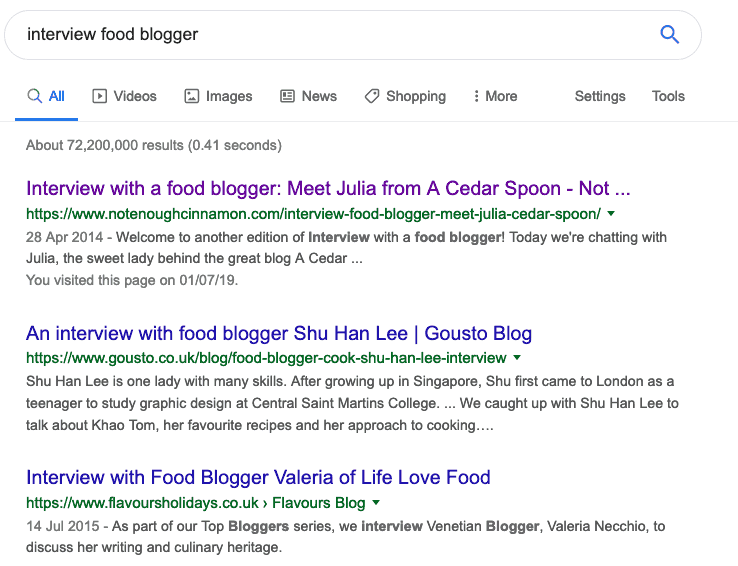When people talk about interview link building, they mostly talk about expert interviews, you interview experts on your blog in the hope that they will then share your interview and link to it.
But doing the opposite also works. If you have interesting hobbies or any kind of expertise, there are likely dozens of blogs and podcasts that would be happy to interview you and you may find getting interviewed easier than finding experts to interview.
As an added bonus, getting interviewed helps you build relationships by offering genuine value and build backlinks in a non sleazy way.
And since people will send you a list of questions to answer or at least guide the process if it’s a podcast, getting interviewed requires little preparation compared to other techniques such as guest posting.
This makes interview link building one of the best link building strategies for new bloggers and business owners.
The 4-step process you are about to discover will show you how to do it.
Step 1: Find interview opportunities
“I’m not an expert, why would anyone interview me?”
My competitors get interviewed a lot but nobody ever contacts me.
“Only top bloggers get interviewed.”
These are objections I frequently hear when I mention interview link building.
And you know what?
They are somewhat justified. It is easier to get interviewed when your name is Will Smith because the more famous you are, the more likely people are to contact you. This is the virtuous circle of backlinks.
There are naturally a few things you can do to be more likely to get interviewed:
- Writing helpful comments on blogs to demonstrate your expertise.
- Mentioning your achievements on your blog’s about page.
- Being active on Twitter and making your achievements clear in your bio.
But you are unlikely to receive interview requests if you are just getting started and don’t have at least a few thousand followers.
Luckily, there is a solution: find interview opportunities yourself and convince people to interview it.
Here is how to do it!
Uncover your interview topics

Start by making a list of all your areas of expertise and hobbies.
The first step to finding interview opportunities is to write down all the possible topics you could talk about. This includes:
- Topics you are an expert in (yoga, cooking with garlic, chess…) You don’t need to be the foremost expert on the matter, you just need to know more than the website or podcast’s audience.
- Topics you could talk about for hours and hobbies (Game of Throne, beekeeping…)
In my case, the list would look something like that:
Topics I’m an expert in:
- SEO
- Blogging
- Marketing/copywriting
Hobbies, conversation topics:
- Language learning
- Creating habits/psychology
- Behavioral economics
- Personal finance
- Life as an expat/traveling
- Fantasy books/ Brandon Sanderson
Ignore the voice telling you you are not an expert and don’t know enough about a topic and simply write down everything that crosses your mind. You can always delete a topic later.
An interview is a conversation. If you could have an interesting conversation with a friend or a colleague on a topic, then it’s a good potential interview topic.
Just to give you an idea, here are just a few of the websites that interviewed me over the years:
- Take Lessons: a platform helping language learners find teachers.
- Français Authentique: a blog helping intermediate students learn French.
- Learn Out Live: a publisher of short stories for language learners
- Expat Focus: a website helping expats.
- Morgan’s Milieu: a blog about blogging and parenting.
Some of these blogs interviewed me about topics I write about on French Together and Grow With Less while others focused on more general topics like my life as an expat.
Getting interviewed by blogs and podcasts in your niche is better for SEO because the more relevant a backlink is, the more powerful it is.
But backlinks from blogs in other niches can still boost your SEO, they simply tend to have less of an impact.
So don’t hesitate to get interviewed by blogs in other niches if an opportunity comes up. You may find that getting interviewed by blogs and podcasts in other niches is easier and therefore a better use of your time.
In my case, getting interviewed on expat blogs was considerably easier than getting interviewed by people in the blogging niche so I decided to focus on this topic for now.
Use Google to quickly find interview opportunities

Once you have your list of interview topics, it’s time to head to your favorite search engine and look for blogs and podcasts that could interview you.
Simply type:
- “interview” + niche or topic
- “Interview series” + niche or topic
- Name of someone else in your niche + interview
- Name of a blog you follow + interview/ interview series
The first query will help you find blogs and podcasts that interview people in your niche while the second and third one will help you find blogs and podcasts that interviewed your competitors.
For example, “interview food blogger” returns thousands of food blogger interviews on a variety of sites, including:
- Small food blogs.
- Well-known food blogs.
- Travel magazines.
- The blog of a company selling recipe boxes.
Not all these blogs and podcasts will interview you but being interviewed by even 5% of these websites could bring you lots of traffic and help you get closer to the number one spot for your dream keyword.
Decide whether it’s a good opportunity or not
Once you have got a list of websites that interview people like you, it’s time to decide who to contact.
The first step is to go to the site and see if the interview was a one-time thing or whether the person regularly interviews people.
I generally don’t contact people if there was only one interview because it means the person interviewed was most likely a friend and they are unlikely to interview a stranger.
In fact, my experience is that contacting blogs that have less than 4 interviews or haven’t interviewed anyone in years is a waste of time.
On the the hand, Blogs that have a regular interview series are great because they are likely to be actively looking for people to interview.
Here are a few other questions I ask myself in order to decide whether an interview opportunity is good or not:
- What kind of people do they interview?
- Are these people like me or much more well-known?
- Is this an interview I would be proud to share with my audience?
- Would I have something useful to share?
The first two questions are essential because a blog that only interviews well-known people is unlikely to interview you if you aren’t similarly well-known.
The last two questions help ensure that you publish high-quality content you will be proud of.
This is important because everything you publish online represents you and your brand. You don’t want to end up with potential customers finding low-quality content you only wrote for SEO.
Step 2: How to convince people to interview you

Convincing someone to interview you should be easy if you have good advice to share.
Once you have done your research, reaching out is relatively easy.
In my experience, there are 3 categories of people doing interviews:
- Bloggers and podcasters.
- Company blogs.
- Newspapers.
Companies and news websites usually have a clear process with instructions on being interviewed.
Small bloggers and podcasters generally don’t have precise instructions but they may write something like “this was my food blogger interview series, if you are interested in participating, click here or contact me at..”
Whether you are trying to get interviewed by a small blogger or for a company’s blog, make sure you look for such instructions and follow them because you will not get an answer if you fail to follow basic instructions.
If you want to be even more likely to get an answer, spend a few weeks reading their content and post a few comments. Basically, show that you care and have interesting ideas to share.
Once you are ready to reach out, send a quick email saying:
- Who you are (I like to start the first line of the email with something unique or something we have in common.)
- Why you are reaching out.
- Why you are worth interviewing (I usually list a few quick points that would interest their audience.)
- Asking if they are interested in interviewing you.
Once your email is written, ask yourself:
- Is this an email I would be happy to receive?
- Does it feel personal?
- Is it obvious I have something unique to share?
- Is there a clear call-to-action?
The most important is to make it easy for them to answer. If answering requires lots of work, they are likely to move on to the next email even if they think interviewing you could be interesting.
Ideally, reading and answering your email shouldn’t take more than a few minutes.
Step 3: Answer the interview questions
In my experience, roughly a third of the people you email will offer to interview you but it depends a lot on the niche and how competitive it is.
For example, I got 0 replies when emailing bloggers in the “make money online” niche while roughly 80% of the people I contacted in the travel and language learning niche replied.
Once they have agreed to interview you, most bloggers will send you a list of questions to answer. At this point, it’s important to:
- Make sure you have read all the instructions.
- Look at previous interviews and their comment section to see what people expect, what readers and listeners are interested in. Some blogs will want you to be straight and to the point while others will ask more personal questions and want a story.
- Always ask “what’s in it for them?”
- Add a link to your blog and twitter/Linkedin profile if previous interviewees did it but don’t overdo it.
- Send your answers and thank the person for the opportunity. Offer to make changes if necessary.
The goal isn’t to answer the questions as quickly as possible but to publish an interview the blog/podcast’s audience will benefit from.
This means you should spend a few minutes looking at other interviews and finding out what the audience cares about.
If I get interviewed by a well-known business blog, I will try to focus on serious topics and actionable advice while I may share more personal details like my favorite type of tea if I get interviewed on a small British blog.
Step 4: Promote the interview
I published dozens of guest posts on my blog French Together and noticed 2 types of guest bloggers:
- People who send you the post, thank you for the opportunity and move on.
- People who send you the post, thank you for the opportunity and come back to answer comments on their guest post and share it on social media.
Which type of person do you think I’m the most likely to invite to guest post again?
The same is true with interview link building. While you don’t necessarily need to share the interview with your email list, I recommend at least doing the following:
- Thank the person who interviewed you.
- Share the post on social media if it’s relevant to your audience.
- Monitor the comment section and answer questions people may ask.
These 3 simple steps are the difference between spammy link building and handcrafted link building strategies like interview link building and journorequest. The goal may be the same but once style creates value while the other only creates frustration.
Have you already been interviewed? How did it go?